Ukraine: Life on mines and demining
First support package from the Netherlands to Ukraine in 2023 includes € 10 million for demining of agricultural land. Why is this so important for Ukrainian and global food security?
The journalists from NGO Hromadske (https://hromadske.ua/en/posts/life-on-mines) visitied the South of Ukraine and collected the stories of local farmers and villagers who literarly live on mines.
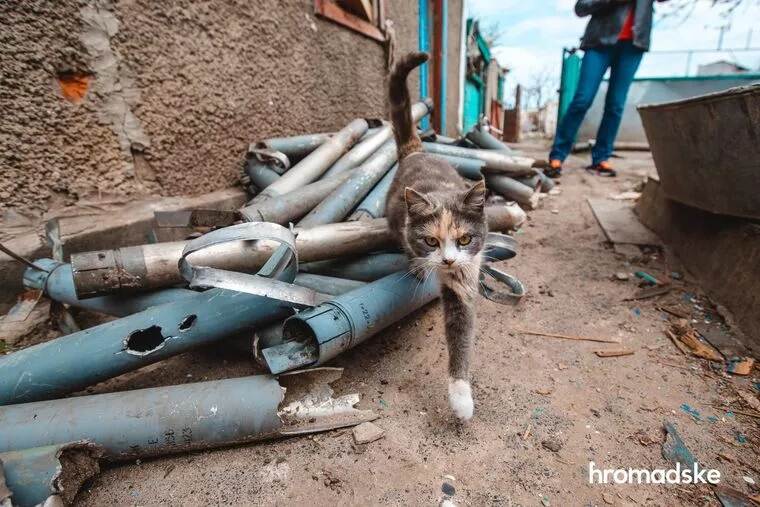
Life on mines
Material by Natalia Mazina, Hromadske https://hromadske.ua/en/posts/life-on-mines
Stop somewhere near a field road,” I ask the driver of the editorial car. He already knows that I need to use the restroom. In Kherson Oblast, there are no gas stations or roadside cafes between villages. It's scary to go behind the bushes. It can be mined anywhere. That's why I choose the roads to the side of the highway. On them, you can at least see what is under your feet. I'm happy when I see tractor tracks, and I'm happy when I see them working in the field.
But they are not everywhere.
The first story. The encouraging one: I will sow if they demine
We are in the small village of Bilohirka in Beryslav Raion. Before the Russian invasion, a little over 100 people lived here. And there were a few farmers: they cultivated the land and had hangars with grain and machinery. Now everything is damaged or destroyed: during the six-month occupation, the front line ran behind the village. The locals had to flee. Now farmers are the first to return because the land feeds them and their shareholders. But it is densely packed with Russian ammunition.
“Follow me strictly,” Volodymyr Marynchenko orders. His voice is commanding and he has the confident look of a man who is used to being in charge. On the way, he carefully maneuvers the car between the craters of explosions. Around us are shot houses, sheds, and fences. Or piles of garbage that used to be these houses, sheds, and fences. There is nothing intact in Bilohirka. It seems the whole place has turned into a big sieve. On the outskirts, in a few houses, the walls have somehow been preserved. We are going there because there are people there. A dozen per village.
Marynchenko lives in the neighboring village of Davydiv Brid. He leases 500 hectares of land. For years, he grew wheat, barley, and sunflower. His three tractors, a combine harvester, seeders, and cultivators were vandalized by the Russians, who burned hundreds of tons of crops. The farmer suffered millions in losses:
“The equipment was burned down, shot up — you can see my seeder lying there — and I still owe the bank for it. I can't tell you how I felt about it. I aged ten years. And then our own people were mean. I and a few other farmers gave the seeds to a company for storage. Now they say that [the seeds] burned because of the orcs. But I live 10 kilometers away, I know that no one was there and nothing burned. They took everything out themselves. They tell fairy tales,” he gets angry and lights a cigarette. “I appealed to the military administration, but there is still no answer.”
I ask if he tried to negotiate with the occupiers. Some farmers brought them boxes of cognac, but it didn't always help.
“I'm used to talking to sane people, and if they came to ‘liberate’ us, then what is there to talk about,” he waves his hand. “As their chief said: ‘There is no land for us on the right bank of the Inhulets” (across the Inhulets river is Mykolaiv Oblast, there was no occupation there — ed.)
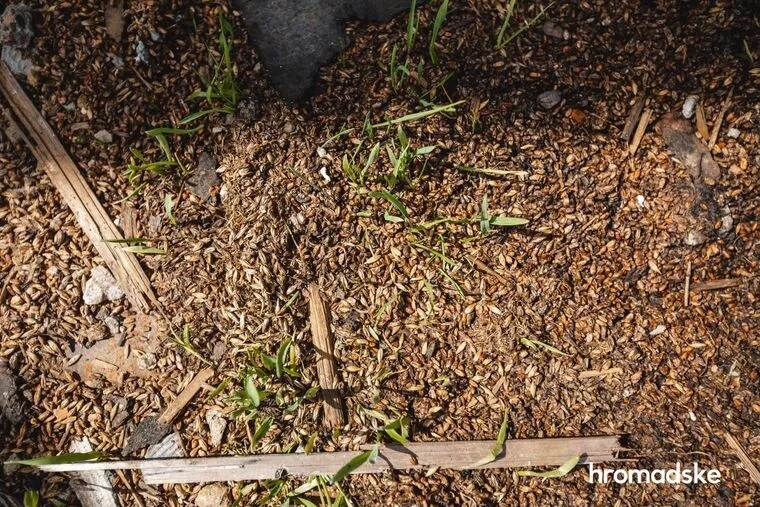
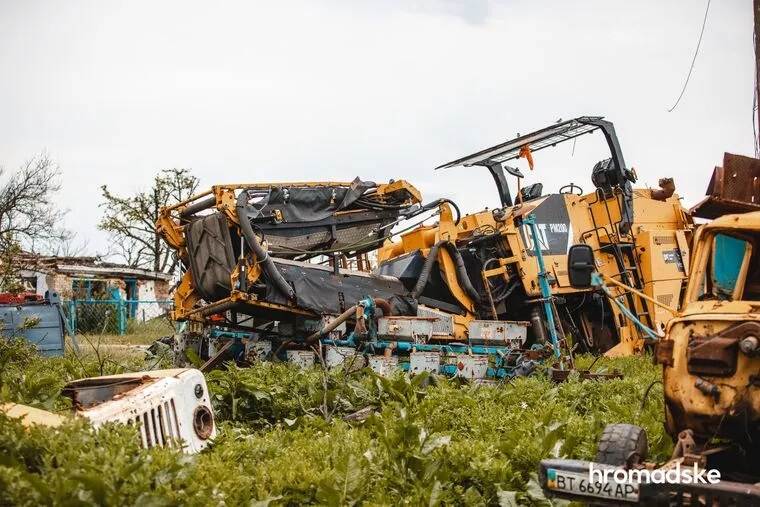
Being a sensible and practical person, Volodymyr Ivanovych decided what he would do:
“This year the fields will remain untreated. For the simple reason,” he repeats this phrase often, “Beryslav Raion is constantly under fire. As long as there is a war and missiles are flying, the issue of land is secondary. No one will go into the fields because of the mines — that's the second reason. Thirdly, it's too late. We have a saying: if you sow peas in the mud, you will be a prince. By the beginning of May, everything should be planted. You can still do something by June, but that's it. Only in the fall do we prepare the land and sow winter crops. There is no other way.”
The man is willing to wait for free demining of the fields because he cannot pay 35-50 thousand hryvnias per hectare to private operators.
“It is not worth the price. And then I'll have to pay off for 10 years — I won't live that long. I'm 64 years old, and I need to look at things realistically. I will wait for the demining and do something. Another thing is that it will take time. The shareholders will be silent for another year, and then what will they say?” he stops the car near the agricultural machinery on the roadside. It is covered with holes from the shells.
The second story. The desperate one: I'll sell it all for scrap
“Vadym, why don't you go out to the fields?” Marynchenko calls out to a man of about 35. This is Vadym Ivashchenko. He is assembling a modular house in front of his house. Ten of them were allocated to the village.
Vadym's mother, Raisa Ivashchenko, is the first to approach Marynchenko. “We are back home, Ivanovych. No one needs us anywhere,” she wipes her tears with the sleeve of her warm sweater.
Vadym Ivashchenko owns 100 hectares of land, where he also grew wheat and sunflower. He earned money himself and let people earn it as well. In the fall before the invasion, he made expensive repairs to his house. During the occupation, unable to endure the endless shelling, he left with his wife and daughter. Raisa stayed behind to look after the farm. But it was not very successful. The invaders started stealing fertilizers from her son's warehouse. The pensioner sneaked in at night and started cutting the bags, imagining that she was gutting the Russians. The saltpeter spilled out in white trickles, seeping into the ground. “I won’t get it but neither will you.”
Because of the shelling and bombing, Raisa did not know where to hide. She crawled from the house to the cellar. But they hit there too, piercing the 200-liter water barrel behind which she was hiding. That was when she was most afraid: what if it collapsed? She let her six adult pigs and a cow go free, crossed the farm, and ran away from her home crying. She returned with them. Her heart almost stopped: the only thing left of the house was the walls, but they had holes in them that big that a dog could crawl through. Part of the ceiling fell in, and the cemetery where her other son is buried is also in trouble: the monuments are scattered, and the graves have been turned upside down by the explosions. “Why did they touch the dead?” she asks no one.
Vadym leads a tour of the yard and the garden. His mother follows him in the tall grass, hands folded behind her back, wailing. I feel like she cries every time she has to show someone what used to be a tidy vegetable garden, a well-maintained house, a garage with a car, and a barn with a cow, pigs, and chickens.
Vadym has accepted the reality, even joking sometimes:
“The Russians said: ‘Putin will give you gas,’ but what do I need that gas for? I'm fine with firewood. Here's the Russians' dugout,” he leads us to the scraps of walls from the barn. “They didn't live in houses, they were hiding. Our men on the other side of the river shelled them. The front line ran along it. Here is my vandalized combine harvester. Here's the warehouse: all the grain was burned here. There used to be enough space for everything. I set up a tennis table for my daughter, there is no entertainment in the village after all... I invested everything I had before the invasion in repairs and equipment. Now I have nothing,” he says. His story is interrupted by a loud explosion. The Ukrainian army sappers are walking around the village, checking the dirt roads and roadsides.
The man decided not to set foot on his land. A fellow who had survived the entire occupation went out into the field with a tractor and was blown to death. And with him, four pyrotechnics he had hired.
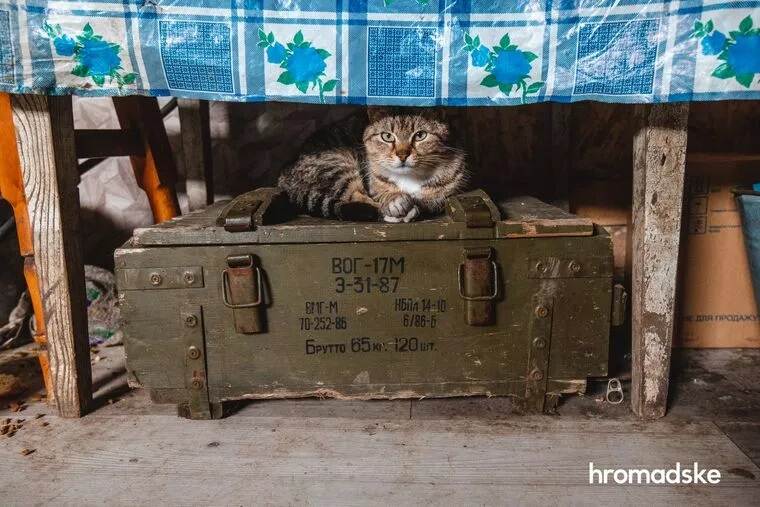
I ask Vadym about his plans.
“I would not come back here, you see: there is nowhere to live and the fields are mined. But the equipment is still there, even though it's shot, it's metal. And people are searching for it, sneaking around. So I'm on guard. It's better to sell everything for scrap myself,” his voice is heavier as if crushed by a stone. “For now, I'm going to the other side of the Inhulets to visit a farmer friend. His workers were taken to the army, so I help him in the field.”
Vadym's family is still in Vinnytsia Oblast. He wants to move them, but to do so, he needs to buy a house somewhere nearby. But in the neighboring villages, the ones that used to cost 8 thousand dollars are now 15 thousand dollars. For now, he will spend the summer in a modular house. And his mother, who could not sit still in distant lands, decided to be near her son:
“At least I will cook food. And I'll clean up the yard a little bit.”
The first thing she cleared near the house was a flower bed. The tulips are bursting with color. And all over the village, the flowers covered the wounded, torn earth. They also flourish on the ruins.
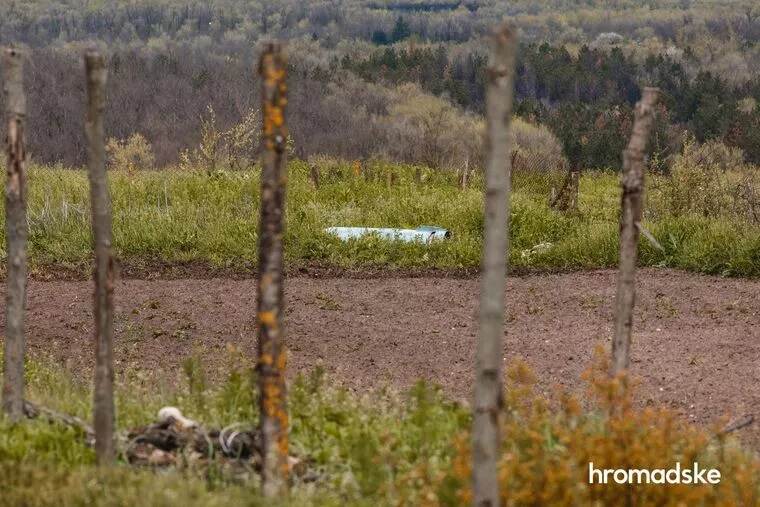
The third story. The economic one: this is our land — it feeds us
Bang! Bang! Bang!
Woo-woo-woo!
Chirp, chirp!
Mines, exploded by sappers, detonate. They set off car alarms. In the meantime, the birds' concert fades and resumes.
The Shcherbyna family lived in three houses near the Ivashchenkos. An elderly couple, their son Oleksandr and daughter Nataliia with their families. All the men in the family worked on their 25 hectares. They grew grains, vegetables, and watermelons. “Oh, they were good!” people in the neighboring villages remember them. A large family left during the invasion of the occupiers. Not everyone wanted to return to the ruins: only the older and younger generations. The grandfather first of all built an outdoor toilet out of brick fragments. And his grandsons, brothers Yevhen and Vadym, did what they always did. They worked on the land.
The military sappers cleared their garden of mines in the fall. The brothers planted vegetables on these 1.5 hectares and set up a greenhouse. It's getting greener there — seedlings are growing.
“We have lived off the land all our lives, as well as our children and grandchildren. We sowed wheat, sold it, and earned a penny,” says Hryhorii Prokopovych. The elderly man is standing in front of his pockmarked house, where the windows and roof are covered with film. He says he wants to show me something. He deftly weaves between piles of garbage made of bricks, rusty pieces of metal, buckets, boots, and other once household treasures, and leads us behind the greenhouse. A few tens of meters away, an unexploded 500-kilogram aircraft bomb lies in the unmowed grass. It can't be dragged away — it can only be detonated on the spot. An explosion of this magnitude will demolish everything within a two-kilometer radius. That's why sappers advise not to touch it. It will be defused one day.
Meanwhile, Hryhorii's wife, Valentyna Romanivna, is talking to Marynchenko. Her gray hair is poking out from under her gray pompom hat. She says:
“Yesterday, Ivanovych, there was something like this here, airplanes were flying overhead — it was scary. People are being killed like flies, and there are so many mines in the weeds. People are dying every day. Yesterday, a 30-year-old guy went fishing and died. We asked him a hundred times: you can't go fishing, for firewood or metal! I've seen all kinds of mines here. But I haven't seen any 'petals' yet, so show me what they look like.”
“I found 12 of them at home,” the farmer looks for a photo on his phone, “It would be better if you didn't find them.”
“God forbid. And I'm sweeping up shells in the yard at home, and I can't pick them all up,” the woman points to a bucket filled with sharp fragments.
The elderly couple leads the way to the river behind their yard. Marynchenko orders us to follow strictly behind them and not to move away. Here and there, the tails of shells stick out of the ground, and the spring grass covers the anti-tank mines. They are not visible. And now several antipersonnel mines Shcherbyna family have marked with pegs.
“Come closer,” Valentyna Romanivna calls out to me, “You'll see.”
“I don't feel like it,” I answer.
“If you don't step on it, nothing will happen,” the woman responds directly.
We are on a hill. Below us, the Inhulets River winds like a blue ribbon. On the other side, the forest is green. It's beautiful.
“There were so many fish! There were so many mushrooms in that forest! I knew everything,” the pensioner says, “But it was cut short.”
She really wants to show the antenna of a Russian tank that drowned in the river with the tanker. The Russian was shell-shocked, and the tank circled the village, crushing pigs and ramming sheds, until it rolled into the water.
“That bastard drowned,” the woman says with disdain. I want to see the antenna too, but I'm not allowed to go there. So I'm just happy about the fact.
We will demine Ukraine for at least 15 years if no one helps
The Shcherbyna family's dog hit a mine, so they welcomed a red-headed stray and two cats. One of them gave birth to kittens, and they put them in a box in the summer kitchen. Hryhorii Prokopovych says that cats are needed: there are a lot of rats in the villages.
Ukrainian army sappers come to the yard, and a man leads them to the bomb. They confirm that it is already known that it should not be touched. The soldiers follow the pensioner to the hill behind the house. Soon we hear the mines he had shown us earlier being detonated.
Pyrotechnics teams from the State Emergency Service are working along the roads, under power lines, in Kherson Oblast. They are clearing the ground so that electricians can safely bring in electricity. There is still no electricity in 80 villages. As well as gas and water.
“The territory of potentially mined agricultural land in the de-occupied territories of Ukraine is 380,000 hectares,” Oleksandr Dvoretskyi, head of the de-mining teams of the State Emergency Service of Ukraine in Kherson Oblast, says over the phone. “One sapper clears 10 square meters per day, and a group of five people clears 50 square meters. What does it look like, if you can imagine? This is an area one meter wide and 50 meters long. There are 10 thousand square meters in one hectare. To the farmers who come to us and say: ‘Guys, how long will it take you to clear my field?’ and the field is 2.5 hectares, you need to think about these numbers. That is why we have not yet entered the fields. The first thing we need to do is build the infrastructure. We can't just break up. We have brought our brigades from all over Ukraine to the Kherson region. There are not enough people. This is a stalemate. Without the involvement of international organizations and equipment, we will not be able to clean up the mess ourselves. Or if we do, will have enough work for at least 15 years. And we also have to go to the other side of the Dnipro when it is liberated.”
Some farmers in Kherson Oblast are waiting for humanitarian demining. This is when every centimeter of the territory is examined. Afterwards, the land is clean. There are no mines, not even a nail. Such demining can be public, private Ukrainian (certified), and foreign. But it is not yet available in the region and it is not known when it will be.
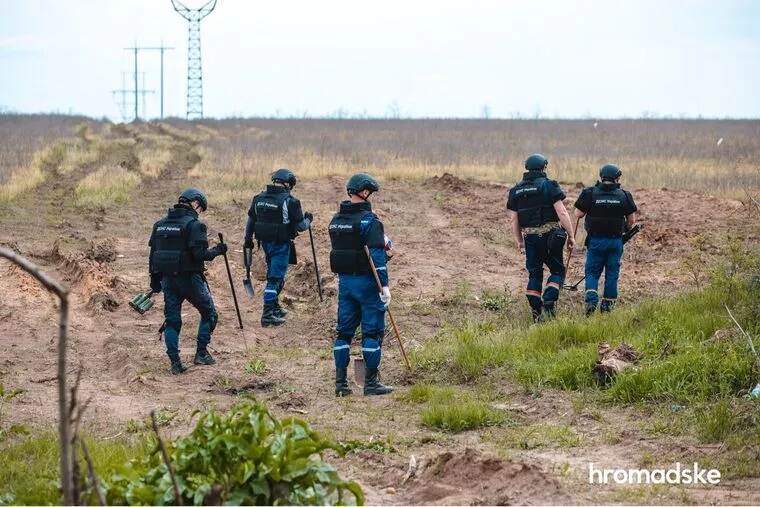
Valentyna Shcherbyna says goodbye to us in the courtyard:
“In the evacuation, we lived with kind people. I am grateful to them for only charging us for the rent. But this is an apartment. I sometimes went out on the balcony and looked down at the ground. And now we are back — and I feel better,” she bends down, mechanically picks up the debris from the road, and puts it in her pocket. It's dangerous, I say.
“It's not how it should be. And whether it's dangerous or not... we don't think about it anymore. We get through the day and we are thankful for that.”
Read more on the website https://hromadske.ua/en/posts/life-on-mines
Subscribe to:
https://www.facebook.com/hromadskeua